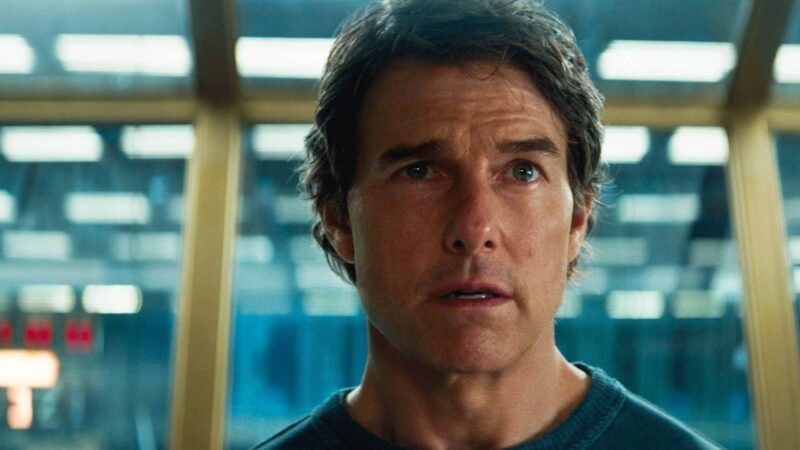In Mission: Impossible—The Final Reckoning, Tom Cruise Does What the U.S. Government Can't
To protect America, maybe what we really need to fund is more Tom Cruise.

What the U.S. government can't do, Tom Cruise can.
If there's a lesson to be learned from the latest, and decidedly not greatest, installment of the Mission: Impossible franchise, that's it. The president, the nation's top military generals, the entire intelligence apparatus—they're all powerless to stop an apocalypse-by-MacGuffin. Only Ethan Hunt, the Impossible Mission Force agent who is really just a nom de guerre for the on-screen persona of Tom Cruise, has what it takes to save the world. Forget the bloated defense budget. To protect America, what we really need to fund is more Tom Cruise.
Granted, the Mission: Impossible films are not exactly designed to impart lessons about governance and geopolitics. They are extravagant stunt spectacles, powered by the awe of watching an aging movie star appear to risk his life for our entertainment.
But when the movie opens with Cruise's Hunt being beckoned by the American president, and then moves on to a series of sequences in which the American executive's top advisers recommend foolish courses of action that threaten to destroy the world rather than save it—including sacrificing an American city because reasons—well, inadvertently or not, the movie ends up saying something.
And that something is: The government, the military, the elites in charge of keeping America and the world safe are all hopelessly out of their depth. Only Tom Cruise can save us.
Or at least that's the premise. On the strength of the movie's first hour—and there are nearly three of them—I'm less confident. Where previous Mission: Impossible films have opened with tightly wound set pieces, this installment, which notably comes with the word final in its title, spends nearly a third of its run time mucking around with expository, repetitious, tedious, borderline excruciating self-congratulation.
It's as if the movie wants to say: Remember all those other Mission: Impossible movies, with their incredible stunts and half-baked plots? Remember how long Tom Cruise has been doing this? Remember the last scene, just before this one, which also asked you to remember the franchise's high points, and which also tried to connect the series' vague lore to whatever it is that's threatening the world now, again?
The opening hour of brutally earnest, mostly thrill-free lookbacks is a major misstep from a series that has thrived both by staying funny and avoiding most franchise baggage and back-patting series lore. The story specifics were never the point of the M:I series, and asking viewers to recall them in order to connect the dots for this presumably final outing is demanding, well, the impossible.
The film improves considerably in the second half, when the gargantuan set pieces finally arrive. There's one on a sunken submarine that involves Hunt almost drowning. There's another, heavily teased in the promotional materials, on a pair of candy-colored prop planes that involves Hunt almost dying. Sure, there's a bad guy—the mysterious Gabriel, who aims to control the artificial intelligence known as the entity—but the real enemies are oxygen, gravity, speed, inertial force. Cruise, who really hung from those prop planes, just as he really jumped a motorcycle into a canyon and scaled the outside of the Burj Khalifa, is determined to outwit the entirety of known physics.
When he does, the results are frequently astounding. The prop plane sequence alone is worth the price of a ticket. The submarine set piece would be the highlight of any other action movie.
As with military budgets, however, this sort of thing quickly becomes prohibitively expensive. The movie, which was repeatedly reimagined and rewritten, and which shot on and off for nearly two years, is reportedly among the most expensive ever made. The submarine sequence alone apparently went $25 million over budget when the submarine broke. Presumably, the U.S. military can relate.
In the end, Mission: Impossible—The Final Reckoning is a bloated, self-regarding, incoherent mishmash. But it's a bloated, self-regarding, incoherent mishmash that resolves in two of the most impressive, most jaw-dropping, most gotta-see-that-again, can-you-believe-it action set pieces in recent memory. Cruise doesn't just fight physics. He wins.
Like the U.S. government, there's a lot of waste and confusion and excess. Unlike the U.S. government, Cruise, and the franchise that has become his signature product, delivers the goods when it really counts. Mission accomplished.


Show Comments (8)